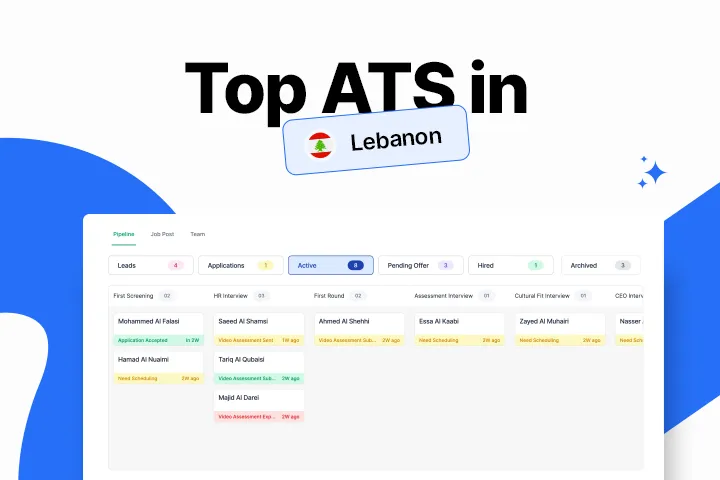تنفيذ الفحص متعدد المراحل للتحقق من المؤهلات والمهارات والمهارات الشخصية.
استفد من ATS وأدوات التقييم لتبسيط التوظيف وتتبع البيانات.
اجمع بين التقييمات المنظمة وفحوصات الامتثال التنظيمي للتعيينات الموثوقة.
تشهد صناعة الطيران في قيرغيزستان نموًا مطردًا، مما أدى إلى زيادة الطلب على طاقم الطائرة الماهر وموظفي الطيران. يواجه مديرو شركات الطيران والموارد البشرية التحدي المزدوج المتمثل في توظيف المواهب ذات المهارات التشغيلية القوية مع ضمان الامتثال لمعايير الطيران المحلية والدولية.
يعد الفحص الفعال لمرشحي طاقم الطائرة أمرًا بالغ الأهمية. بدون عمليات منظمة، تخاطر شركات الطيران بتوظيف مرشحين غير مؤهلين. زيادة حجم التداول، ومواجهة قضايا الامتثال التشغيلي. إن تطبيق ممارسات الفحص القوية يضمن التوظيف المناسب، ويبسط التوظيف، ويحمي سمعة العلامة التجارية والسلامة التشغيلية في قطاع الطيران القرغيزي المتنامي.
اكتشف المزيد: التوظيف المدعوم بالذكاء الاصطناعي بما يتجاوز البحث المنطقي.
التحديات المشتركة في توظيف موظفي الطيران في قيرغيزستان
1. مجموعة محدودة من المرشحين المؤهلين
تمتلك قيرغيزستان مجموعة صغيرة نسبيًا من محترفي الطيران المدربين. يعد العثور على طاقم الطائرة الذي يتمتع بالشهادات والخبرة وخبرة خدمة العملاء أمرًا صعبًا. تؤدي هذه الندرة إلى إبطاء الجداول الزمنية للتوظيف وزيادة المنافسة بين شركات الطيران. يجب على مديري الموارد البشرية الاستفادة بنشاط من منصات التوظيف وشبكات المواهب المحلية لتحديد المرشحين المناسبين.
2. حواجز اللغة والتواصل
يعد إتقان اللغة الإنجليزية والتواصل متعدد اللغات أمرًا ضروريًا في مجال الطيران. قد يفتقر العديد من المرشحين إلى المهارات اللغوية الكافية للرحلات الدولية. يجب على فرق الموارد البشرية التحقق من إتقان اللغة الإنجليزية واللغات الأخرى التي تتطلبها شركات الطيران. يمكن أن يؤثر سوء التواصل على السلامة التشغيلية وجودة خدمة العملاء والأداء العام لشركة الطيران.
3. الالتزام بلوائح الطيران
يجب على المرشحين تلبية معايير الامتثال الدولية والوطنية، بما في ذلك التراخيص والتدريب على السلامة والشهادات التنظيمية. إن ضمان التزام كل متقدم بهذه المعايير أمر معقد. مديرو الموارد البشرية يجب التحقق من صحة المستندات وإكمال التدريب والامتثال التنظيمي لمنع المخاطر التشغيلية المحتملة والانتهاكات التنظيمية.
4. مشاكل ارتفاع معدل الدوران والاحتفاظ
يواجه قطاع الطيران معدل دوران متكرر للموظفين بسبب الفرص العالمية والأدوار ذات الأجور المرتفعة في الخارج. هذه يؤثر التحدي على التوظيف التكلفة والاستمرارية التشغيلية. يجب على شركات الطيران إعطاء الأولوية لاستراتيجيات الاحتفاظ والمرشحين المستهدفين بما يتماشى مع الثقافة التنظيمية وفرص التطوير الوظيفي لتقليل الاستنزاف.
5. الفحص للمهارات اللينة
تتطلب أدوار طاقم الطائرة مهارات التعامل مع الآخرين والعمل الجماعي وقدرات حل المشكلات. غالبًا ما يكون تقييم كفاءة خدمة العملاء والملاءمة الثقافية أمرًا صعبًا من خلال السير الذاتية وحدها. تساعد طرق الفحص المنظمة والمحاكاة والتقييمات القائمة على المقابلات مديري الموارد البشرية على تحديد المرشحين القادرين على تقديم خدمة استثنائية تحت الضغط التشغيلي.
اكتشف المزيد: 7 تقنيات مثبتة لإدارة الوقت للقائمين بالتوظيف
أفضل الممارسات لفحص طاقم الطائرة وموظفي الطيران
1. تحديد متطلبات الوظيفة الواضحة
وضع مواصفات تفصيلية للدور، بما في ذلك المهارات الفنية والشهادات وإتقان اللغة والخبرة السابقة. تمكّن المتطلبات المحددة بوضوح مديري الموارد البشرية من تصفية المرشحين بكفاءة. هذا يقلل من الطلبات غير المتطابقة ويضمن أن المرشحين المختارين يستوفون المعايير التشغيلية والتنظيمية لشركة الطيران.
2. استخدم نماذج الطلبات المهيكلة
تسمح نماذج الطلبات الموحدة لفرق الموارد البشرية بجمع معلومات موحدة. تعمل حقول الشهادات واللغات والخبرة والمهارات على تبسيط التصفية والمقارنة. يقلل هذا النهج من جهود الفحص اليدوي ويضمن أن المرشحين الذين يستوفون الحد الأدنى من المعايير فقط يتقدمون إلى مرحلة التوظيف التالية.
3. إجراء فحص متعدد المراحل
- راجع السيرة الذاتية للتحقق من المؤهلات والخبرة.
- الفحص الأولي عبر الهاتف أو الإنترنت لتقييم مهارات الاتصال.
- مقابلات شخصية أو افتراضية للتقييم الفني والسلوكي.
يزيد الفحص متعدد المراحل من الدقة في اختيار المرشح ويضمن فقط وصول المتقدمين المؤهلين إلى مرحلة المقابلة النهائية.
4. تقييم المهارات اللينة بشكل فعال
قم بتقييم مهارات التعامل مع الآخرين وكفاءة خدمة العملاء باستخدام لعب الأدوار والأسئلة الظرفية والتقييمات القائمة على السيناريوهات. يمكن لمديري الموارد البشرية محاكاة مهام طاقم الطائرة الحقيقية لمراقبة استجابات المرشحين. وهذا يضمن للموظفين الحفاظ على جودة الخدمة وإدارة حالات الضغط العالي أثناء الرحلات الجوية.
5. تحقق من الشهادات وخبرة العمل
قم بتأكيد جميع تراخيص الطيران وخبرة الطيران السابقة وإكمال برامج التدريب الإلزامية. يقلل التحقق من مخاطر التعيينات غير المتوافقة. يمكن لمديري الموارد البشرية أيضًا قياس المرشحين وفقًا لمعايير الصناعة للحفاظ على السلامة والكفاءة التشغيلية.
اكتشف المزيد: كيفية تحسين تجربة المرشح أثناء مقابلات الفيديو بالذكاء الاصطناعي
6. استخدم اختبارات اللغة والتواصل
قم بإجراء تقييمات اللغة للتحقق من اللغة الإنجليزية واللغات الإضافية المطلوبة. تعتمد الكفاءة التشغيلية والسلامة على التواصل الفعال. تساعد الاختبارات الموحدة فرق الموارد البشرية على تقييم الكفاءة بموضوعية وتحديد المرشحين المستعدين للرحلات الدولية.
7. قم بتضمين التقييمات السلوكية والشخصية
تقييم العمل الجماعي والقدرة على التكيف وإدارة الإجهاد وحل النزاعات. تحدد تقييمات الشخصية المرشحين الذين يتوافقون مع ثقافة شركات الطيران وتوقعات الخدمة. يستفيد مديرو الموارد البشرية من الرؤى الموضوعية لسلوك المرشح تحت الضغوط التشغيلية.
8. الاستفادة من التكنولوجيا للفحص
استخدم أنظمة تتبع المتقدمين (ATS)والتقييمات الآلية والمقابلات بالفيديو لتبسيط عملية التوظيف. تتيح التكنولوجيا وضع قوائم مختصرة بشكل أسرع وتقليل الخطأ البشري والحفاظ على قاعدة بيانات منظمة للمرشحين. وهذا يسمح لمديري الموارد البشرية بمراقبة كفاءة خطوط الأنابيب وقياس أداء التوظيف.
9. إجراء فحوصات الخلفية والمراجع
تحقق من تاريخ التوظيف والسجلات الجنائية والمراجع المهنية. هذه الفحوصات تمنع مخاطر التوظيف وتضمن الجدارة بالثقة وتحافظ على سمعة شركة الطيران. توفر الفحوصات المرجعية المنظمة أيضًا نظرة ثاقبة لموثوقية المرشح والأداء السابق في أدوار الطيران.
10. تحديث معايير الفحص بانتظام
قم بتكييف معايير الفحص بناءً على سياسات شركات الطيران المتطورة والتغييرات التنظيمية واتجاهات الصناعة. تضمن التحديثات المستمرة أن يظل مديرو الموارد البشرية متوافقين وتنافسيين، وتجذب المرشحين الذين يستوفون المتطلبات التشغيلية الحالية.
اكتشف المزيد: كيفية تقليل الوقت لمراجعة المرشحين
الخاتمة
يمثل فحص المواهب في مجال الطيران في قيرغيزستان تحديات فريدة، من المرشحين المحليين المحدودين إلى الامتثال الصارم ومتطلبات اللغة. يضمن تطبيق الفحص المنظم متعدد المراحل أن تقوم شركات الطيران بتوظيف طاقم مقصورة ماهر ومتوافق وموثوق. يؤدي الجمع بين أفضل الممارسات والتكنولوجيا إلى تحسين التوظيف وتحسين الاستبقاء وتعزيز الأداء التشغيلي في قطاع الطيران المتنامي في قيرغيزستان.




